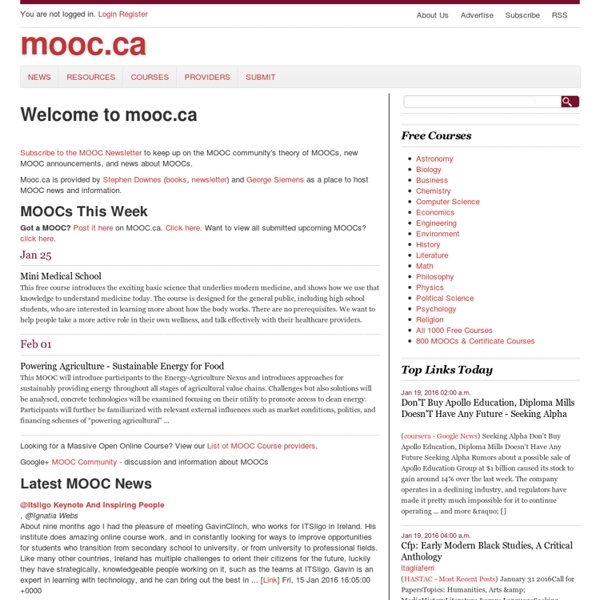



Free Online Courses From Top Universities | Academic Earth Three Kinds of MOOCs « Lisa By Lisa, on August 15th, 2012 We are so into MOOCs now that it’s too much for me. Gotta apply Ockham’s Razor 2.0 to this stuff. At the Ed-Media conference, I attended a session by Sarah Schrire of Kibbutzim College of Education in Tel Aviv. In her discussion of Troubleshooting MOOCs, she noted the dificulties in determining her own direction in offering a MOOC in the “Stanford model” MOOCs versus the “connectivism” MOOCs. Each type of MOOC has all three elements (networks, tasks and content), but each has a goal that is dominant. Network-based MOOCs are the original MOOCs, taught by Alec Couros, George Siemens, Stephen Downes, Dave Cormier. Task-based MOOCs emphasize skills in the sense that they ask the learner to complete certain types of work. Content-based MOOCs are the ones with huge enrollments, commercial prospects, big university professors, automated testing, and exposure in the popular press.
10 Universities Offering Free Writing Courses Online See our list of universities that offer free online writing courses. Learn about what courses are available and what topics they cover to find the course that's right for you. Online Writing Courses for Credit Many schools offer free online courses and materials through OpenCourseWare (OCW) projects. While formal admission isn't necessary to access lectures and other materials, these courses don't usually award college credit. For far less than the cost of enrolling in a traditional class, Education Portal offers hundreds of online courses that allow students to start working their way towards real college credit. Conventions in Writing: Usage - Instructors discuss tips for developing clear sentence structures, good diction and a strong writing style.Parts of an Essay - This chapter covers prewriting strategies and methods for organizing an essay. Free Online Non-Credited Writing Courses Massachusetts Institute of Technology (MIT) New Jersey Institute of Technology Technical Writing
change.mooc.ca A Quick NOTE about Course Search Listings MOOC MOOC Learning Materials Learn your learning style, find materials in the language you choose to learn and even find a language partner.To view a... see more Learn your learning style, find materials in the language you choose to learn and even find a language partner.To view a video of the award winning author, go to View Lingu@net Europa - World Languages Award Winner 2007 video Lingu@net World Wide is based on the idea that if you are learning or teaching a language you could be interested in relevant resources in any language you understand - not only the resources you can find by searching in your mother tongue.Lingu@net World Wide gives multilingual access to over 3,500catalogued online resources, many of them specifically for learners. It also offers support for adult learners on how to learn a language, how to assess your level and how to communicate with other learners online. Peer Review for material titled "Linguanet Europa (now Linguanet Worldwide)" About this material:
A Close Up Look at an Upcoming May MOOC Wow. Seems this week is filled with news of online education start-ups and the beginnings of universities that offer massive open online classes (MOOCs). Here are three such articles from the past two days alone. 1. Online-Education Start-Up Teams With Top-Ranked Universities to Offer Free Courses, by Nick DeSantis, Chronicle of Higher Education, April 18, 2012. 2. 3. With all the announcements lately about open education and free online courses, I thought I should do one too. Well anyway, here is the news. This course will be free and open to anyone with Web access. Blackboard Note related to the event: According to Blackboard, "As a free resource for individual educators, CourseSites has removed a common barrier of access to teaching and learning technology. Per Blackboard: Announcing a Free, Open Course With Dr. Course Title: Instructional Ideas and Technology Tools for Online Success Link to the landing page: Interest Form Blog Announcement: Empowering You Through Openness and Choice
What is a connectivist MOOC? | Connectivist MOOCs “MOOCs” are massive open online courses. Dave Cormier introduces the MOOC: There’s a great written explanation of MOOCs in the introduction to the PLENK2010 MOOC Stephen Downes explains: This longer interview with George Siemens and Howard Rheingold is also a very helpful introduction to connectivism: August 2012′s MOOCMOOC was a one-week course led by Hybrid Pedagogy which examined the MOOC medium. As a springboard for more on MOOCs, check out the readings from Sunday and Monday and have a look at this piece on the MOOC Misnomer which does a nice job of dismantling lazy use of the term. A shorthand has emerged which distinguishes between connectivist courses – cMOOCs – and ones that are more broadcast-focused and reliant upon certification and peer testing. I’ve made my own attempt at distinguishing between xMOOCs and cMOOCs. This site exists to point people towards connectivist courses. xMOOCs are already excellently served by Class Central.